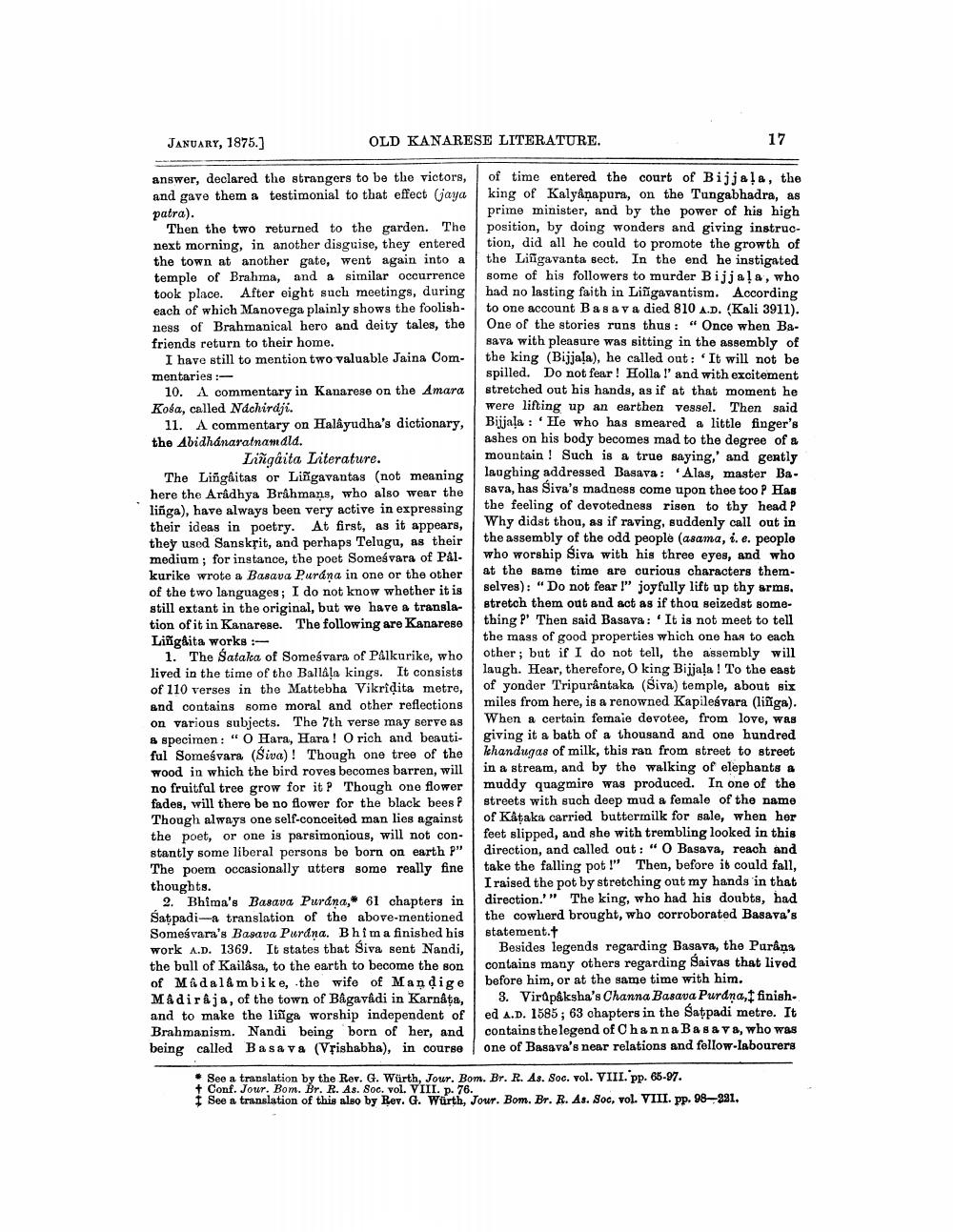________________
JANUARY, 1875.]
OLD KANARESE LITERATURE.
answer, declared the strangers to be the victors, and gave them a testimonial to that effect (jaya patra).
Then the two returned to the garden. The next morning, in another disguise, they entered the town at another gate, went again into a temple of Brahma, and a similar occurrence took place. After eight such meetings, during each of which Manovega plainly shows the foolishness of Brahmanical hero and deity tales, the friends return to their home.
I have still to mention two valuable Jaina Commentaries :
10. A commentary in Kanarese on the Amara Kosa, called Ndchirdji.
11. A commentary on Halâyudha's dictionary, the Abidhanaratnamdia.
Liñgaita Literature. The Liñghitas or Liñgavantas (not meaning here the Aradhya Brahmans, who also wear the liñga), have always been very active in expressing their ideas in poetry. At first, as it appears, they used Sanskrit, and perhaps Telugu, as their medium; for instance, the poet Someśvara of Pal. kurike wrote a Basava Purana in one or the other of the two languages; I do not know whether it is still extant in the original, but we have a translation of it in Kanarese. The following are Kanarese Lingâita works :
1. The Sataka of Someśvara of PAlkurike, who lived in the time of the Ballála kings. It consists of 110 verses in the Mattebha Vikridita metre, and contains some moral and other reflections on various subjects. The 7th verse may serve as & specimen: "O Hara, Hara! O rich and beautiful Someśvara (Śiva)! Though one tree of the wood in which the bird roves becomes barren, will no fruitful treo grow for it? Though one flower fades, will there be no flower for the black bees? Though always one self-conceited man lies against the poet, or one is parsimonious, will not constantly some liberal persons be born on earth P" The poem occasionally utters some really fine thoughts.
2. Bhima's Basava Purana, 61 chapters in Satpadia translation of the above-mentioned Someśvara's Basava Purdna. Bhima finished his work A.D. 1369. It states that Siva sent Nandi, the bull of Kailasa, to the earth to become the son of Madalambike, the wife of Mandige Madirêja, of the town of Bagavadi in Karnata, and to make the liñga worship independent of Brahmanism. Nandi being born of her, and being called Basava (Vpishabha), in course
of time entered the court of Bijjala, the king of Kalyanapura, on the Tungabhadra, as prime minister, and by the power of his high position, by doing wonders and giving instruction, did all he could to promote the growth of the Lingavanta sect. In the end he instigat some of his followers to murder Bijjala, who had no lasting faith in Liñgavantism. According to one account Basav a died 810 A.D. (Kali 3911). One of the stories runs thus : "Once when Basava with pleasure was sitting in the assembly of the king (Bijjala), he called out: 'It will not be spilled. Do not fear! Holla! and with excitement stretched out his hands, as if at that moment he were lifting up an earthen vessel. Then said Bijjala : 'He who has smeared a little finger's ashes on his body becomes mad to the degree of & mountain ! Such is a true saying,' and gently laughing addressed Basava : Alas, master Basava, has Siva's madness come upon thee too P Has the feeling of devotedness risen to thy head P Why didst thou, as if raving, suddenly call out in the assembly of the odd people (asama, i. e. people who worship Siva with his three eyes, and who at the same time are curious characters themselves): "Do not fear !" joyfully lift up thy srms. stretch them out and act as if thou seizedst something P' Then said Basava: It is not meet to tell the mass of good properties which one has to each other; but if I do not tell, the assembly will laugh. Hear, therefore, O king Bijjala ! To the east of yonder Tripurantaka (Šiva) temple, about six miles from here, is a renowned Kapilesvara (liñga). When a certain female devotee, from love, was giving it a bath of a thousand and one hundred kehandugas of milk, this ran from street to street in a stream, and by the walking of elephants a muddy quagmire was produced. In one of the streets with such deep mud a female of the name of Kataka carried buttermilk for sale, when her feet slipped, and she with trembling looked in this direction, and called out: " O Basava, reach and take the falling pot !" Then, before it could fall, I raised the pot by stretching out my hands in that direction. The king, who had his doubts, had the cowherd brought, who corroborated Basava's statement.t
Besides legends regarding Basava, the Purana contains many others regarding Saivas that lived before him, or at the same time with him.
3. Virdpåksha's Channa Basava Purana, I finished A.D. 1585; 63 chapters in the Satpadi metre. It contains the legend of Channa Basava, who was one of Basava's near relations and fellow-labourers
. See a translation by the Rev. G. Würth, Jour. Bom. Br. R.As. 800, vol. VIII. pp. 65-97. + Conf. Jour. Bom. Br. R. As. Soc. vol. VIII. p. 76. I see a translation of this also by Rev. G. Würth, Jour. Bom. Br. R. As. Soc, vol. VIII. pp. 98-991,




